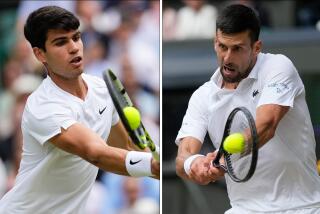TENNIS / FRENCH OPEN : Bandaged Becker Wraps Up 5-Set Victory
- Share via
PARIS — Boris Becker has a bad back, a bad leg and a bad attitude, but he proved Wednesday that he is not ready to say goodby.
He played the last three sets of his 5-7, 1-6, 6-4, 6-4, 6-4 second-round French Open victory over Todd Woodbridge with his right thigh wrapped, and when he limped into the interview room at the end of the 4-hour 25-minute match, Becker revealed little about his injury.
In fact, he refused to say he has an injury at all but merely patted his thigh and called it “a little problem.”
After all, Becker reasoned, he is still in the tournament, so why give away any trade secrets?
“I don’t want to tell too much about it,” said Becker, who took two weeks off and pulled out of the Italian Open with a back injury.
“I don’t feel that good,” Becker said. “I knew I wasn’t the same guy as yesterday, and that made me mad. At 5-7, 1-6, I said, ‘Well, it’s almost over now, I’d better start from zero.’
“Actually, I don’t know how I won it. I don’t know what happened.”
Woodbridge, a 20-year-old Australian, seemed to tense up slightly with Becker on the ropes. In the fifth set, he held a break point for 5-4 but lost it and tried afterward to find a positive aspect to what happened.
“I just took the No. 2 player in the world to five sets, I think that’s pretty positive,” Woodbridge said. “I’ve got to try not to get too disappointed in myself.”
Woodbridge had chances galore to make Becker an outpatient in the French Open, but the German followed his usual habit and avoided elimination. Actually, Becker could have made it a lot easier on himself, but he blew three set points at 5-3 in the first set.
The low point was at 1-3 and 0-30 in the third set.
‘It didn’t look too good, huh?” Becker asked. “Then, he seemed to sense the chance to beat me and pulled back. Then I smelled a little chance.”
It was the sixth time in his career that he had pulled out a match after losing the first two sets, and he improved his record in five-set matches to 18-8.
It might be worth remembering that Becker’s victory in the Australian Open in January did not come until he had defeated Omar Camporese, 14-12, in the fifth. Becker won the 1989 U.S. Open after surviving match points in an early round, five-set match against Derrick Rostagno.
Andre Agassi slammed his way past Petr Korda, 6-1, 6-2, 6-2, to arrive in the third round and made a quick inventory of his peer group. He must have liked what he saw happening in his half of the draw.
Gone was fifth-seeded Sergi Bruguera, who retired in the fourth set against Camporese after his back stiffened.
Gone, too, was Emilio Sanchez, the 11th-seeded player, who became a four-set casualty at the hands of Jakob Hlasek.
Even after Becker got away from Woodbridge, it still meant that Michael Chang, Guy Forget and Becker are the only seeded players left with Agassi in the bottom half of the draw. And the exits of Bruguera and Sanchez also clears Agassi’s quarter of the draw of any seeded players.
“In the big picture, it helps a little,” Agassi admitted.
Next for Agassi is Patrick McEnroe, who celebrated the two-day anniversary of his first tournament victory on clay by winning again, this time scoring a 7-6 (7-1), 6-3, 6-4 decision over Jason Stoltenberg.
A semifinalist at the Australian Open, where he lost to Becker in four sets, McEnroe said his third-round appearance probably legitimizes how he played in Melbourne, although it has been a long process.
“I’ve been trying to do that the whole year, but at this point, I at least proved to myself that Australia was not a fluke,” McEnroe said.
Chang’s 7-6 (7-4), 4-6, 6-4, 3-6, 6-3 victory over Lars Jonsson, 19, a former Swedish national junior champion, was simply the result of a hard-earned ground battle lasting 3 hours 33 minutes.
After he broke Jonsson for a 2-1 lead in the fifth set, Chang won 15 of the next 17 points, which took him to two match points on Johnson’s serve at 1-5.
But Chang made an unexpected gamble on Jonsson’s second serve and tried to knock it through the backstop on one bounce. Instead, Chang overhit the ball, sent the return long and eventually lost the game.
‘I kind of felt, well, ‘I’m going to crush this one,’ ” Chang said. “I don’t know if I’m ever going to do that again. I guess that was one of my lessons for today.”
Chang lost his serve for 5-3 but broke back to end it, although not until chair umpire Jane Tabor reversed a linesman’s call in Chang’s favor on match point.
Chang saw Jonsson’s forehand clearly wide, although it was called good by the linesman, and summoned Tabor out of the chair to check the mark on the clay. Once the ball hit, Chang thought the match was already over.
“I was ready to jump up and down,” he said. “It was like, ‘What happened to the call?’ ”
Becker was asked if he thought destiny was on his side. “Not yet,” he said. “(But) I hope it’s a good sign.”
Tennis Notes
All four of the seeded female players in action Wednesday advanced to the third round with straight-set victories. They were led by second-seeded Steffi Graf, who routed Petra Langrova, 6-0, 6-1, in 47 minutes. Said Graf: “I didn’t have to run around too much.” . . . Fourth-seeded Mary Joe Fernandez, No. 11 Katerina Maleeva and No. 13 Nathalie Tauziat also advanced. . . . Graf may not have gained any favor among her peers when she was asked if she favored women receiving equal prize money as the men in Grand Slam events, which is the case only at the U.S. Open. “I don’t think about it,” Graf said. “I am not concerned about it. We make enough money. Women’s tennis is more interesting, and we don’t need it right now. We are doing fine. If women played best-of-five (sets), then I would agree they should get the same money.”
More to Read
Go beyond the scoreboard
Get the latest on L.A.'s teams in the daily Sports Report newsletter.
You may occasionally receive promotional content from the Los Angeles Times.










